Appalachia 2024 Presidential Election Review
Author’s Note: All other election reviews can be found here.
This portion of the 2024 Election Compendium focuses on three solid red states in Appalachia – Kentucky, Tennessee, and West Virginia. Other states considered to be part of the region will have their separate review, such as North Carolina, which can be found in the link above.
Outcomes
Kentucky Trump +30.7%
Tennessee Trump +29.7%
West Virginia Trump +41.9%
Kentucky Trump by minimum of 30.0%
Tennessee Trump by minimum of 25.0%
West Virginia Trump by minimum of 40.0%
Preface
What makes these states unique is that they became three of the reddest states in America only two decades after Bill Clinton won them all twice. All have backed every GOP nominee since 2000, but by enormous margins since Trump became the GOP standard bearer. Incredibly, Kamala Harris won just 5 out of 270 counties spread through these three states.
While completing a comprehensive report on these three states may seem like a technical requirement, it will provide good value in assessing the validity of county outcomes in Pennsylvania, Virginia, North Carolina, and Georgia, which all share overlapping demographics and voter trends with Kentucky, Tennessee, and West Virginia.
Two of these states register by party and showed heavy Republican advancement since 2020:
· Kentucky from D+2.8% in 2020 to R+4.7% in 2024
· West Virginia from D+0.9% in 2020 to R+11.9% in 2024
Analysis
· Kentucky has a substantial population of registered Democrats and is still more than capable of electing Democrats to statewide offices, as evidenced by Andy Beshear holding the governor’s office in the Bluegrass State as one of the last of a dying breed of blue dogs on the left. The state, for the first time in recorded history, flipped to a Republican Party voter registration advantage between 2020 and 2024. 117 of its 120 counties shifted more Republican by registration, with two shifting left as a matter of technicality (were already overwhelmingly Republican), and Fayette County, home to the University of Kentucky and Lexington, inching slightly leftward.
The party registration indicator went 117 for 120 as every single county was stronger for Trump by percentage margin than it was in 2020, a blowout in its own right. Trump was strong enough to override the left shift in registration in Fayette County, and lost only that county and Jefferson County, home to metro Louisville. He cleared 40% in both of those counties.
· Tennessee was almost equally brutal for Harris, as all 95 counties were more Republican (or less Democrat) in percentage margin than they were in 2020. Harris was left holding just Shelby (metro Memphis) and Davidson (metro Nashville) Counties, which both shifted roughly five points to the right, and Haywood County, which hasn’t backed the GOP nominee since 1972 and came within 25 votes of doing so this year. The Volunteer State doesn’t register by party, but it is clear the state is on an overwhelmingly Republican trajectory.
· All 55 counties in West Virginia went to Trump as he garnered almost exactly 70% of the vote in the state. Since 2012, no Democrat presidential nominee has carried a single county in the state. Like Kentucky, the Mountain State flipped to a GOP registration advantage for the first time in between the 2020 and 2024 elections, and all 55 counties shifted to the right in that regard.
The party registration indicator went 54 for 55 in West Virginia, with only Tucker County nudging left in margin thanks to depopulation and ensuing lower turnout on both sides. West Virginia has lost population in recent years and even gave up an electoral vote in the most recent apportionment, suggesting the state is likely maxed out and at an apogee point for GOP nominees, particularly moving forward from the Trump era.
· Harris made no gains in Kentucky or West Virginia, and was limited to just population based growth in rapidly developing areas in Tennessee, particularly in the mountainous eastern region of the state.
· These three states, especially West Virginia, are almost maxed out for Republican margin; still, Harris fell back another 292,822 votes net, including by 201,836 in rapidly growing Tennessee. Out of 270 counties collectively, Harris gained votes in just seven counties, with none reaching Grade 2 in severity (over 2,000 net new votes gained since 2020). This means Harris underperformed Biden in votes in 97.4% of all counties in the three states, and lagged Clinton in wide swaths of all three states.
· 269 of 270 counties shifted more Republican for Trump. Between Kentucky and West Virginia, the two states in this grouping that register voters by party, the party registration indicator was 171 for 175 in predicting county trajectory, with three of the misses being in counties showing a left registration shift that was overpowered by Trump.
Opportunities for Election Manipulation
Here is how these three states rank with regard to my most commonly assessed demerits.
· Voter ID – Kentucky and Tennessee have strong photo ID laws. West Virginia has ID requirements, but they are relatively weak and have loopholes present.
· Same Day Registration – All three states do not allow for Same Day Registration.
· Excessive Mail-In Voting – None of these states have universal mail-in voting.
· Ballot Harvesting – All states have reasonable laws to deter ballot harvesting.
· Ranked Choice Voting – Not present in any of these states.
· Automatic Voter Registration – West Virginia operates Automatic Voter Registration, which is a hallmark of blue states and a leading causes of voter registration corruption.
The Pathway Ahead
These states, like those in the Deep South, will be Republican for generations at the presidential level, and it is likely Kentucky will follow West Virginia in being unwinnable for Democrats at the state level as soon as the Beshear family name runs out of gas at the end of the governor’s tenure.
Election hawks in these states have the same duties as prescribed in the Deep South, ensuring no stupid ballot measures or ideas get their way into public view or legislative chambers. Tennessee is not in jeopardy of becoming a Democrat state, but based on where the growth is occurring, a few cycles of change could alter the balance of power significantly in legislative composition, as seen in Texas and Arizona in the past decade.
Final Grades and Closing Commentary
It is clear, with Harris lagging Biden in over 97% of all counties, there was no widespread effort to stuff ballots in these states. This does not rule out the possibility that it is occurring in local races, but this region appears to have been left to run organically, and the result was a major Trump shift.
The Top 5 Election Integrity Targets in Appalachia are (in no order):
· Jefferson County, KY
· Fayette County, KY
· Davidson County, TN
· Knox County, TN
· Shelby County, TN
Most Suspect Outcome
· none
Kentucky receives a Grade of 1 – Lowest Concern – based on 2024 shifts and the presence of strong election laws.
Tennessee receives a Grade of 1 – Lowest Concern – based on 2024 shifts and the presence of strong election laws.
West Virginia receives a Grade of 2 – Marginal Concern – based on its demerits and potential to suffer manipulated results based on legal shortcomings.
Demerits: Weak Voter ID, Automatic Voter Registration
Seth Keshel, MBA, is a former Army Captain of Military Intelligence and Afghanistan veteran. His analytical method of election forecasting and analytics is known worldwide, and he has been commended by President Donald J. Trump for his work in the field.




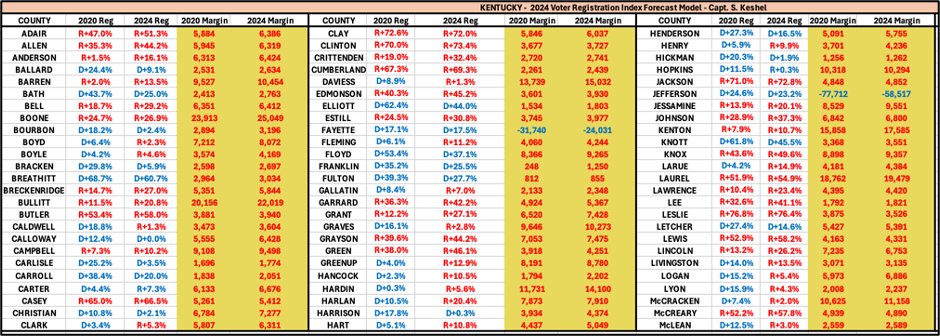
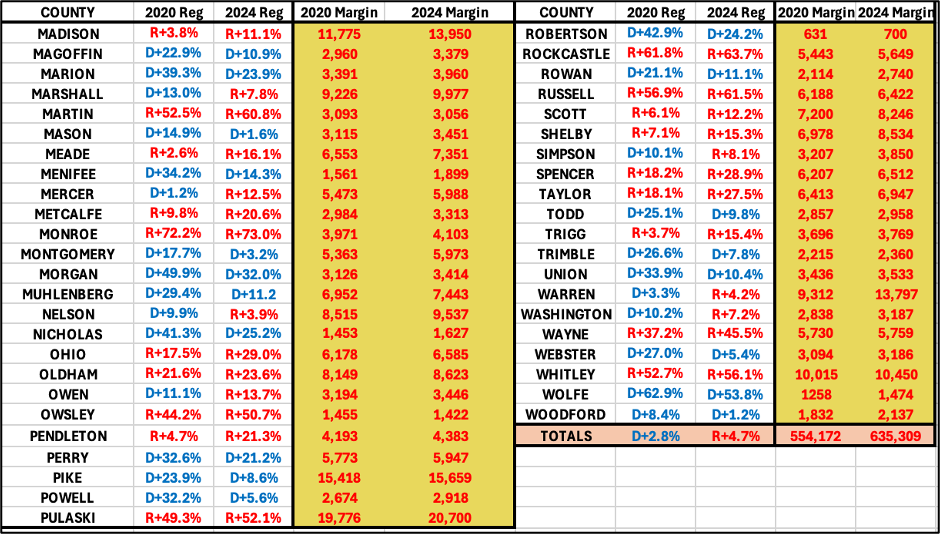
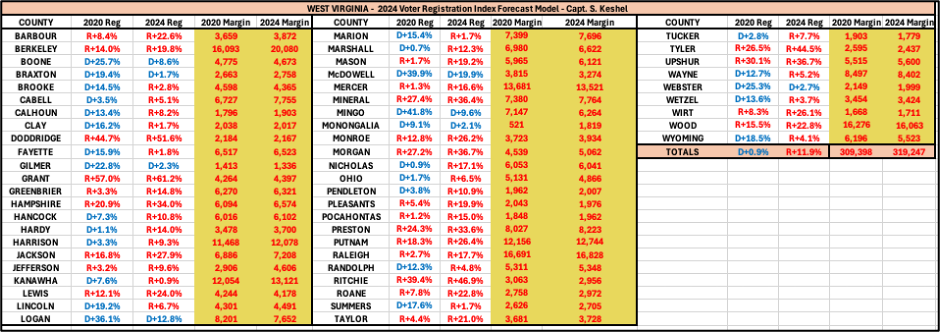
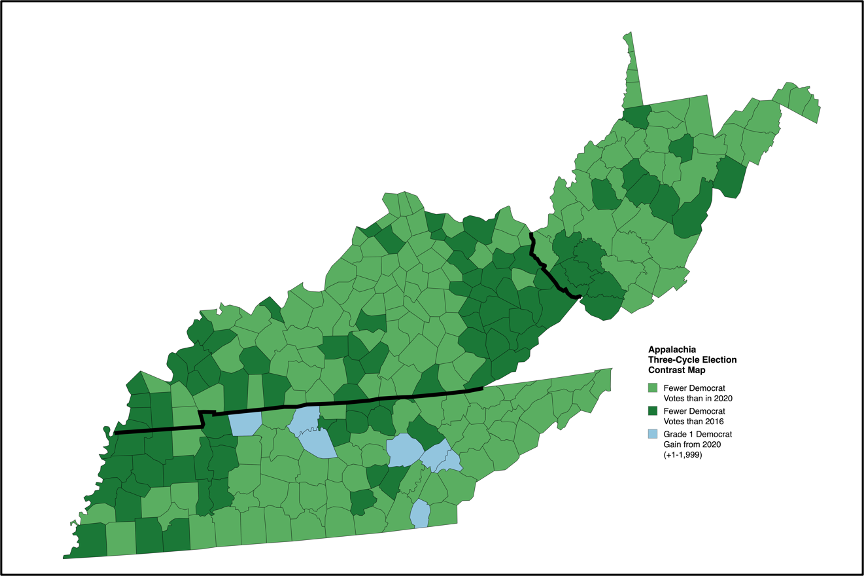
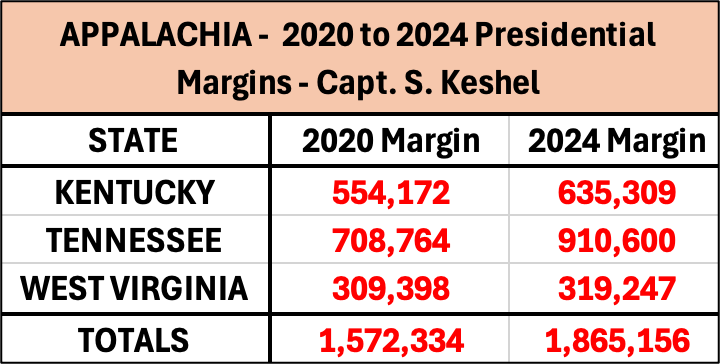
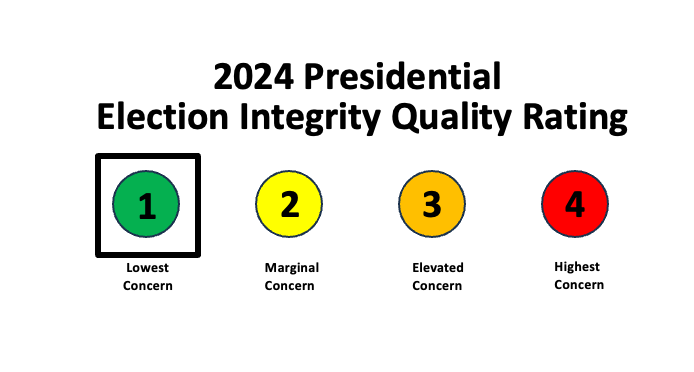
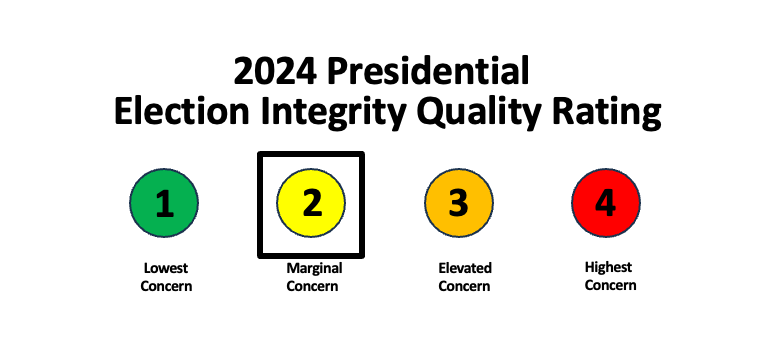
Living in Nashville, our priority has to be on ridding our state of the RINOs currently largely in control at the state level, including our governor, and bringing sanity into those blue urban areas including Nashville, Memphis, Chattanooga, and Knoxville that are currently controlled by Marxist Dems.
Thank you so much for the work you do. At least in Tennessee, the work of the election fraud cartel seems to be focused on propping up the RINOs in our open primary elections and maintaining the few blue urban areas. We however are stymied in efforts to advance election integrity by an incredible level of complacency. We need a better strategy.